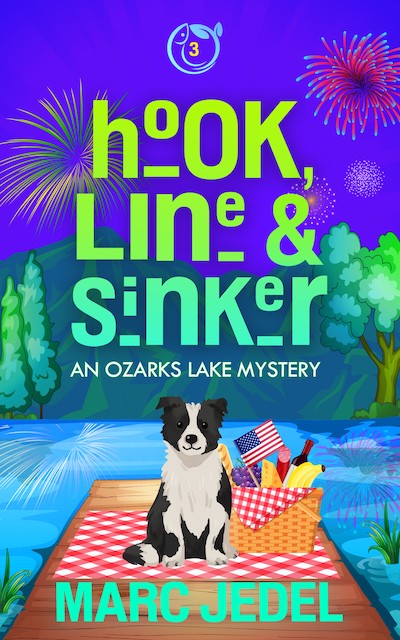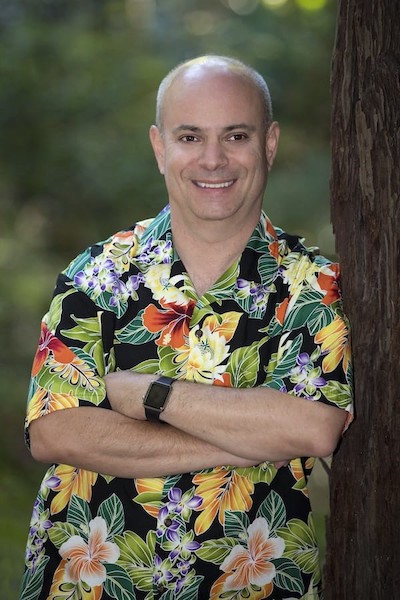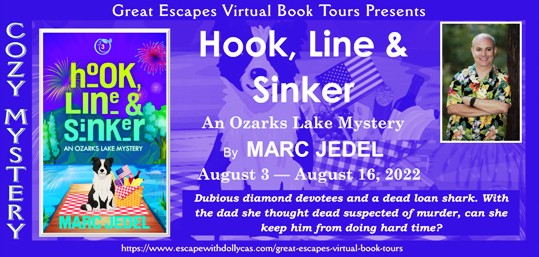
Q. When did you first consider yourself to be an author?
I believe my entire professional life in marketing has been about writing fiction. We just called it emails, websites, and marketing collateral. After wanting to write a book for many years, I finally buckled down to actually trying it. Lots of work, walks with my wife and dog, and drafts led to my first novel getting published. The next ones have come easier, but still involved a lot of dog walking. Because my dog doesn’t laugh at my jokes nor contribute much in the way of dialogue, he doesn’t get co-author credit.
I feel like I earned permission to change my description from writer to author by finishing my first novel and getting it published.
Q. Any advice for a new/prospective writer?
Read more and read widely. Reading different authors and in genres is the best way to learn what works and what doesn’t. And start writing. It’s easier than ever to become an author but just as difficult as always to be a good one. Practice with a diary or use some of the writing prompts you can find on the internet.
Q. What is the easiest part of the writing process for you?
Besides working in an imaginary world where I can knock off any character who displeases—or frustrates—me in an instant? When I first started writing a novel, I was surprised to find that I was far better at dialogue than I had expected. My friends and family kept telling me that they weren’t surprised that this part went smoothly because they felt talking was never one of my weaknesses.
When I have a good outline, I find I can focus on crisp writing and coming up with funny situations and anecdotes to throw in. This also means fewer rounds of editing, which helps me hang on to what little sanity remains.
Q. What is your favorite part of this story?
My favorite parts of this story are the interactions between Elizabeth and her close friend Kelsey. I frequently laughed at their teasing of each other and enjoyed interspersing humor, genuine affection, and plot points into scenes that kept getting funnier as the two amateurs struggled to make headway in their investigative efforts.

Q. How do you distinguish between your two POV characters?
Surprising myself, I found it easier to write from Elizabeth’s point of view more than from her husband’s (Jonas). Perhaps this was because I focused a lot on making him quite different from the male protagonist in my other cozy mystery series, the Silicon Valley Mystery series.
Elizabeth and Jonas have very different personalities and I wanted their “voices” to sound different from each other in the roughly alternating chapters told from their respective first-person perspectives. Elizabeth is typically the one who says or does the funny thing and provokes reactions. Jonas is very calm, accepting, and even a little obsessive-compulsive. He recognizes and appreciates funny things that happen around him but doesn’t initiate funny.
I found myself enjoying how Elizabeth seemed to be the actual ‘fish out of water’ even though she grew up in the fictional small town. Throughout the series, she’s struggling with the idea of maturing and coming to grips with her hometown, mother, and newlywed life.
Q. What did you find to be the hardest about writing this story? Why?
I always seem to spend an inordinate amount of time brainstorming ways that amateur sleuths can investigate a crime in a reasonable fashion. I thought it would be fun, and more challenging, to have the protagonist have no special ties to the police. I find many cozies feel too unrealistic when the amateur sleuths have some special “in” that gives them access to all the police information on clues, police reports, etc. Avoiding this would make my stories more realistic and better with competent police, who don’t share confidential info and actually make headway on their own. Real police would be annoyed that these amateurs are interfering. I try to have the police actually discover some confirming information on their own—just moving at a slower pace than our heroes—that verifies the amateur’s findings but the reader doesn’t learn this until after the criminal is caught.
Learn more about Marc Jedel at marcjedel.com. Want more author news? If so, click here to read my Behind the Story interviews from your favorite authors or follow me on Twitter.


Thanks for hosting me today. I hope your readers will enjoy Hook, Line and Sinker. The whole Ozarks Lake Mystery series can be found on Amazon at: http://getbook.at/OzarksLake. My other series, the Silicon Valley Mystery series, now has 5 books and is at: http://getbook.at/SiliconValley. They’re all free for Kindle Unlimited members.